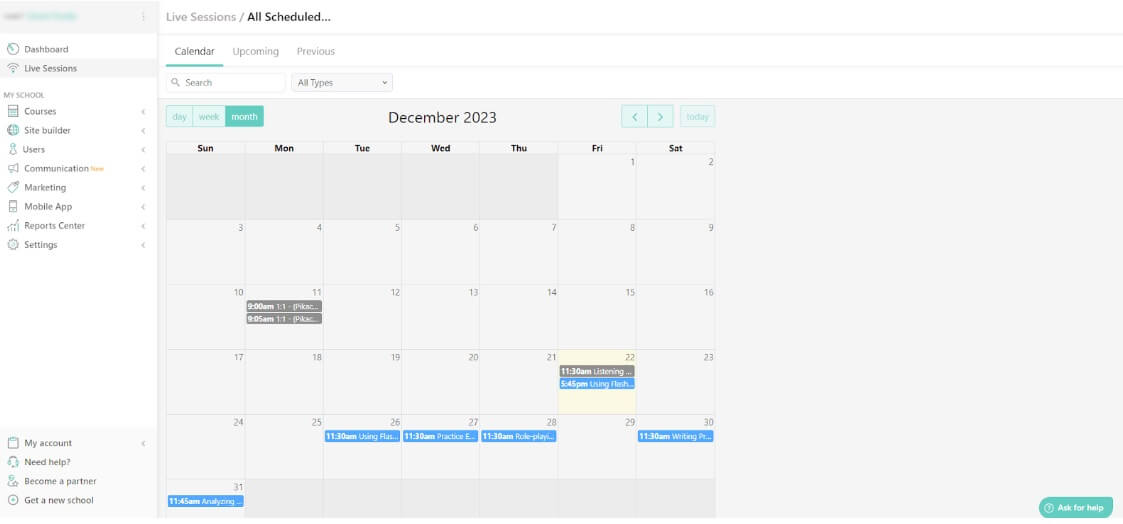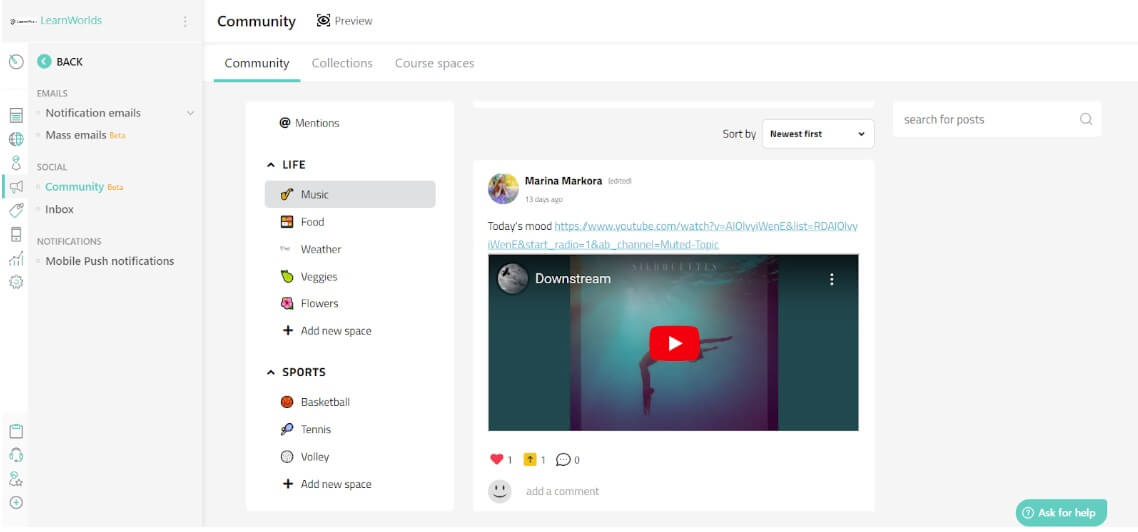Table of Contents
Over the last few years and most evidently after the COVID-19 pandemic, opportunities for remote work have expanded exponentially. While many educators were forced to move online, others saw it as an opportunity to scale their business efforts.
Currently, one of the most popular and rewarding ways to earn money online is by teaching English. The demand for English language proficiency continues to grow globally, and it is expected to expand at a CAGR of 10.27%, reaching 98343.38 million USD by 2028. Such a number confirms that having a strong command of the language can open up a lucrative career path.
This article aims to guide both aspiring and established online English teachers through the process of teaching the language online and exploring the different approaches available. It also offers guidance on which steps to take, the qualifications needed, and which learning platforms to choose from.
If that’s you, stay put. Here’s what we’re covering:
Before we go on, if you are looking for a platform to set up your online school and start teaching English online, LearnWorlds offers the best all-in-one solution. Get your 30-day free trial and start creating your first online course today.
Why Teach English Online?
There are many benefits to teaching English online.
To begin with, it is a highly rewarding job in terms of pay. According to the International TEFL Academy, as an online English teacher, you can earn between $10-40 per hour depending on the type of lesson, your qualifications, and where your students come from. When working independently, you are responsible for your own rates too, and can potentially earn more than that.
On top of the financial aspect though, you will be in charge of educating the masses from the comfort of your own home or while you are on the move. Teaching English online gives you the flexibility to work your own time and the freedom to come up with your lesson plans, packed with unique learning activities that you create and develop.
Unlike the traditional classroom, teaching English online takes away all the paperwork and makes everything easier, simpler, and more enjoyable.
💁 How to Teach Online: Your Handbook to Success
When it comes to teaching online as an English teacher you have three options. There is the option to either work for a company that teaches the English language through an online portal, teach as a freelancer, or start your online course business, launching your online academy.
Let’s look at all three options in more detail.
1Working for Online Teaching Companies
As an English teacher, you could be working for online teaching companies. This option is great if you are just starting because most companies find the students for you and provide you with the lesson materials you need for your online language lessons.
There are many online English teaching jobs available, but you have to be able to choose a teaching company that offers what you need and suits you best.
Some companies will require that you complete a certain amount of minimum hours, which means you will have to arrange your schedule in a way that can accommodate those teaching hours. Others will offer bonuses and extra incentives once you meet specific criteria, e.g. number of learners booked.
Here are some respectable English teaching companies out there:
The majority of these employers offer the opportunity to work mainly with young learners from China, Japan, Korea, France, and Germany. So make sure to consider the different time zones when planning on teaching learners from Asia, for example.
To land a job with them, make sure to check the application process of each company as it may vary. This usually includes completing an application form, submitting relevant qualifications, and sending them a short recorded demo lesson.
2Teaching English Online as a Freelancer
Another great way to teach online is to post your teacher profile in an online marketplace or freelance site. Platforms like Italki, Preply, or Upwork, can bring you closer to students and can act like your teaching agents.
Through these websites, learners have the option to browse teacher profiles and can choose you to become their English teacher or online GCSE English tutor. As a freelancer, you will have your own schedule, set your hourly rates, issue your invoices, and have a say in the taught lesson materials.
You can also provide private lessons to local students as you would normally, using a web-conferencing tool like Zoom, or a webinar tool like LiveWebinars.
💁 The 16 Best Webinar Platforms: Comparison Guide for 2024
3Teaching Online Using an eLearning Platform
Last but not least, you have the option to start your own online business – and work for yourself, using a modern all-in-one online learning platform like LearnWorlds. This option gives you the flexibility to create your teaching material from scratch and teach in a virtual classroom either in a one-to-one or group setting.
The only difference with the other options is that as an edupreneur you will need to build your student base. Doing so will have you heavily investing in marketing, including email and social media. What’s best with eLearning platforms is having the possibility to build your own website, invest in your personal branding, conduct live or recorded classes, and make use of an automated sales engine that can grow to a teaching business rather than a side income or part-time activity.
Each pathway has its advantages and disadvantages and depends on what you are after in terms of working conditions, pay rate, and the work you are prepared to put into it.
Teaching English online is possible as long as you have the right qualifications. While some online teaching platforms will allow you to teach with no degree or prior teaching experience, most will expect you to have the relevant expertise and teaching certificate.
TEFL, TESL, TESOL, and CELTA are the four different types of certifications you need to be able to teach English to non-native speakers.
To decide which one you should get, you need to know and decide where you want to teach.
TEFL: Teaching English as a Foreign Language
The TEFL certification is for you if you want to teach abroad in countries where English is not a first language e.g. Korea, China, etc. It is the most widely recognized certificate and can help you secure many teaching positions abroad including ESL teachers, certified teachers, or other administrative roles.
TESL: Teaching English as a Second Language
TESL is suited for people who want to teach English in Canada or in countries where English is their first language. Such a certification allows you to teach English as a Second Language to students whose first language is not English. TESL needs to be recognized by TESL Canada before you can start working as a language support teacher or a private school instructor.
TESOL: Teaching English to Speakers of Other Languages
TESOL is a certification that allows you to teach in both native and non-native English-speaking countries. It is regulated by the government in countries including the US, UK, Canada, and Australia and aims to teach English to learners at a domestic level e.g. to Spanish-speaking students in the same countries.
CELTA: Certificate in English Language Teaching to Adults
CELTA is a Cambridge English teaching qualification that is globally recognized and most often requested by employers. The majority of English language teaching jobs (3 out of 4) nowadays require a CELTA qualification. It is suitable not only for teachers who want to travel and teach English abroad but also for those with no years of teaching experience.
By becoming TEFL certified, you are eligible to teach English as an online teacher. Earning at least a 120-hour TEFL certificate from an accredited course provider is ideal and most desirable as it equips you with all the necessary skills and experience to work as an English tutor.
💁 If you are interested in online TEFL Courses, check out this resource.
Having a Bachelor’s degree (in any subject) and relevant TEFL teaching experience (formal or informal) always counts as a plus, but so is pursuing a specialist course in English. Because there are many specialty courses it’s important to decide what type of teaching job you want to take early on.
If you are a native speaker of the English language, it will be easier for you to start teaching since most online English teaching companies prefer that, but this doesn’t mean it is impossible to succeed as a non-native English speaker.
How to Start Teaching English Online: 4 Steps
Apart from getting qualified though, ensuring that you have everything you need to work as an online English tutor or start your own business, is vital.
Here’s what you need to do:
Step #1: Gather your equipment
Teaching English online can take place anywhere since it allows you to work from remote locations. However, it requires an internet connection (Wifi), a computer/laptop, a webcam, a reliable video conferencing tool like Zoom or Skype, and a headset.
Such equipment should help you carry out your online classes smoothly and efficiently.
Step #2: Decide on the student demographic
It’s important to study your student demographic before you take on an online English teaching job or decide to open your own business. Conducting some research on your students’ characteristics – age group, gender, nationality, and location should help you find out how well-prepared you are to meet their needs.
Step #3: Choose a teaching style
Deciding how your online classroom is going to be conducted is another crucial consideration. Are you going to teach students on a one-to-one basis or deliver online group classes? This will have you thinking about what’s the most appropriate teaching style to use.
While this is a pre-set for those working for an online English teaching company – where you have to follow more specific rules, as an entrepreneur you need to experiment with different styles of teaching and choose the one(s) that work best for you.
Step #4: Pick your niche
Before you go into online English teaching, you need to explore the different types of English lessons you can offer.
These are the most common:
Completing a specialty course or having additional knowledge on either of these topics – or any other niche that requires the use of the English language, can help determine your primary teaching focus. Also, it can help you prepare for these classes – in terms of lesson planning, more effectively.
If you are considering teaching English as an ‘edupreneur’ – a term that describes an entrepreneur who works in the education sector, LearnWorlds is the best platform for you.
With our powerful course builder, you can create unique online courses within minutes, and build an online academy entirely around offering online English lessons to students.
Our platform’s unique features and tools can make your life easy, allowing you to build interactive learning content and conduct live classes with your students.
Here’s how:
Add H5P Content to Your English Language Courses
LearnWorlds supports H5P content which means that you can create language-learning-specific assessment activities to enhance comprehension or create exercises on the reading, writing, and listening skills required to learn the English language.
Some of the most prominent language-learning activities are:
To create more specialized activities, English language tutors just like other foreign language teachers will need to use H5P at an additional cost for hosting those activities. Then once you create your content using H5P, you can easily embed it in your LearnWorlds course.
💁 For more info on creating H5P content read our relevant article here.
Use Zoom, WebEx, or Calendly to Deliver Online English Classes
LearnWorlds comes with WebEx, Zoom, and Calendly integrations that allow you to schedule and conduct live classes – the ideal method of delivering English language lessons.
Both WebEx and Zoom enable a virtual classroom environment that comes with a whiteboard, which is a much-needed tool for many teachers who are used to teaching with one. Calendly can also be used to schedule lessons in a calendar view as shown below.

💁To use Zoom, you will first need an account, which you can create here.
Using Zoom to conduct live classes that take less than 40 minutes is free of charge.
💁If you prefer Webex, you will also need an account which you can get here.
Build a Vibrant Online Learning Community for Your Students
Learning that takes place as part of a community, enhances knowledge and understanding of the taught material, even more so when teaching English to a diverse group of learners. That’s why we made sure to incorporate some robust social features into our platform.

With LearnWorlds, you can build your community, and add Collections that contain Spaces and course discussions. Spaces (public or private) allow students to interact with each other, share/like posts, and add comments, images, videos, polls, mentions, upvotes, and reactions.
You also have the flexibility to set user roles inside your community and even appoint a Community Manager or Space Manager.
💁 Learn how you can create and manage your community here.
Ready to Monetize Your Knowledge Online?
English is the mother tongue of the internet and computer technology. For the majority of people, learning how to speak English increases their chances of doing well at school, securing a job, advancing at work, and succeeding in the world of business.
If you want to help people improve their ability to communicate with others in the world’s most popular language or simply earn money as a digital nomad, you can start teaching it online today.
Become more acquainted with online learning platforms like LearnWorlds, and easily reach out to learners from all over the world.
Q.1: Can you teach English online without a degree?
Yes, you can teach English online without a Bachelor’s degree. The most important qualification you need to have is the TEFL certification, which is most widely accepted.
Q.2: What do you need to teach English online?
Teaching English online requires an internet connection (Wifi), a computer/laptop, a webcam, a reliable video conferencing tool like Zoom or Skype, and a headset.
Q.3: Can you teach English online full time?
Yes, some online English teaching companies allow you to work on a full-time basis. This varies per company, so you will need to check the teaching hours each one allows e.g. the minimum hours required.
Q.4: How much does it pay to teach English online?
As an online English teacher, you can earn between $10-40 per hour depending on the type of lesson you teach, your qualifications, and where your students come from.
Q.5: Is it easy to teach English online?
Teaching English online is easy as long as you know what you are after. If you want to secure a job with an employer you simply go through the application process and you get hired. If you want to open your own business as a teacher, find the online learning platform that suits you best and start offering online classes.
Q.6: Is it safe to teach English online?
To ensure whether it is safe to teach English online, check what each online English teaching employer can offer in terms of data protection.
Q.7: How old do you have to be to teach English online?
To be able to teach English online, you need to be an adult with a college or university degree or relevant certification.
Q.8: What qualifications do you need to teach English online?
Qualifications required to teach English online may vary per employer. Generally, obtaining a 120-hour TEFL certificate from an accredited course provider is most desirable since it is the TEFL industry’s standard.
Kyriaki is a Content Creator for the LearnWorlds team writing about marketing and e-learning, helping course creators on their journey to create, market, and sell their online courses. Equipped with a degree in Career Guidance, she has a strong background in education management and career success. In her free time, she gets crafty and musical.


